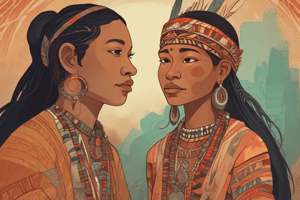Podcast
Questions and Answers
Which of the following best describes the primary purpose of the Indigenous Peoples' Rights Act (IPRA) of 1997?
Which of the following best describes the primary purpose of the Indigenous Peoples' Rights Act (IPRA) of 1997?
- To assimilate Indigenous Cultural Communities/Indigenous Peoples (ICCs/IPs) into mainstream society.
- To establish a national registry of all ICCs/IPs in the Philippines.
- To recognize, protect, and promote the rights of Indigenous Cultural Communities/Indigenous Peoples (ICCs/IPs). (correct)
- To facilitate the exploitation of natural resources within ancestral domains.
Under the IPRA, what document formally recognizes the rights of IPs to their ancestral domains?
Under the IPRA, what document formally recognizes the rights of IPs to their ancestral domains?
- Special Patent
- Certificate of Ancestral Domain Title (CADT) (correct)
- Certificate of Land Ownership Award (CLOA)
- Free Patent
Which of the following is NOT a key right recognized under the Indigenous Peoples Rights Act (IPRA)?
Which of the following is NOT a key right recognized under the Indigenous Peoples Rights Act (IPRA)?
- Right to Ancestral Domains and Lands
- Right to own firearms for self-defense. (correct)
- Right to Self-Governance and Empowerment
- Right to Social Justice and Human Rights
What is the primary role of the National Commission on Indigenous Peoples (NCIP)?
What is the primary role of the National Commission on Indigenous Peoples (NCIP)?
Which international document, while non-binding, sets minimum standards for the well-being of Indigenous Peoples?
Which international document, while non-binding, sets minimum standards for the well-being of Indigenous Peoples?
According to the UNDRIP, what does the right to self-determination primarily entail for Indigenous Peoples?
According to the UNDRIP, what does the right to self-determination primarily entail for Indigenous Peoples?
What principle requires governments and project developers to obtain consent from IPs before implementing projects affecting their lands?
What principle requires governments and project developers to obtain consent from IPs before implementing projects affecting their lands?
In the context of Free, Prior, and Informed Consent (FPIC), what does 'prior' refer to?
In the context of Free, Prior, and Informed Consent (FPIC), what does 'prior' refer to?
Which element of FPIC ensures that IPs receive comprehensive details about a proposed project's scope and potential impact?
Which element of FPIC ensures that IPs receive comprehensive details about a proposed project's scope and potential impact?
What socioeconomic disparity is highlighted by the data indicating that child mortality rates among IPs are significantly higher than in non-IP communities?
What socioeconomic disparity is highlighted by the data indicating that child mortality rates among IPs are significantly higher than in non-IP communities?
Which of the following practices is essential for upholding the 'free' element of FPIC?
Which of the following practices is essential for upholding the 'free' element of FPIC?
What is the significance of recognizing Indigenous Knowledge Systems and Practices (IKSPs)?
What is the significance of recognizing Indigenous Knowledge Systems and Practices (IKSPs)?
What action can the NCIP take to ensure compliance with FPIC in development projects?
What action can the NCIP take to ensure compliance with FPIC in development projects?
How does the IPRA contribute to the empowerment of Indigenous Peoples?
How does the IPRA contribute to the empowerment of Indigenous Peoples?
Which of the following is an example of upholding the right to cultural integrity for Indigenous Peoples?
Which of the following is an example of upholding the right to cultural integrity for Indigenous Peoples?
Why is the right to participate in decision-making crucial for Indigenous Peoples, as outlined in UNDRIP?
Why is the right to participate in decision-making crucial for Indigenous Peoples, as outlined in UNDRIP?
How might a development project infringe upon the cultural integrity of an Indigenous community?
How might a development project infringe upon the cultural integrity of an Indigenous community?
What action would best demonstrate respect for the right of Indigenous Peoples to Free, Prior, and Informed Consent regarding a proposed mining project on their ancestral land?
What action would best demonstrate respect for the right of Indigenous Peoples to Free, Prior, and Informed Consent regarding a proposed mining project on their ancestral land?
Which body is primarily responsible for conducting ancestral domain mapping and documentation?
Which body is primarily responsible for conducting ancestral domain mapping and documentation?
What might be a constructive measure to address the educational challenges faced by Indigenous Peoples, considering that a significant percentage has not completed formal education?
What might be a constructive measure to address the educational challenges faced by Indigenous Peoples, considering that a significant percentage has not completed formal education?
Flashcards
What is the IPRA?
What is the IPRA?
Republic Act No. 8371, also known as the Indigenous Peoples' Rights Act of 1997, aims to recognize, protect, and promote the rights of Indigenous Cultural Communities/Indigenous Peoples (ICCs/IPs) in the Philippines.
What is the NCIP?
What is the NCIP?
The independent government agency in charge of implementing IPRA, including ancestral domain mapping and CADT issuance.
Right to Ancestral Domains
Right to Ancestral Domains
Legal recognition of IPs' claims to lands they have occupied and utilized since time immemorial.
What is CADT?
What is CADT?
Signup and view all the flashcards
Right to Self-Governance
Right to Self-Governance
Signup and view all the flashcards
Right to Social Justice
Right to Social Justice
Signup and view all the flashcards
Right to Cultural Integrity
Right to Cultural Integrity
Signup and view all the flashcards
Indigenous Knowledge Systems and Practices (IKSPs)
Indigenous Knowledge Systems and Practices (IKSPs)
Signup and view all the flashcards
What is UNDRIP?
What is UNDRIP?
Signup and view all the flashcards
Right to Self-determination (UNDRIP)
Right to Self-determination (UNDRIP)
Signup and view all the flashcards
Rights to Land and Resources (UNDRIP)
Rights to Land and Resources (UNDRIP)
Signup and view all the flashcards
Right to Culture, Identity, and Language (UNDRIP)
Right to Culture, Identity, and Language (UNDRIP)
Signup and view all the flashcards
Right to Participate in Decision-Making (UNDRIP)
Right to Participate in Decision-Making (UNDRIP)
Signup and view all the flashcards
What is FPIC?
What is FPIC?
Signup and view all the flashcards
What does 'Free' mean in FPIC?
What does 'Free' mean in FPIC?
Signup and view all the flashcards
What does 'Prior' mean in FPIC?
What does 'Prior' mean in FPIC?
Signup and view all the flashcards
What does 'Informed' mean in FPIC?
What does 'Informed' mean in FPIC?
Signup and view all the flashcards
What does 'Consent' mean in FPIC?
What does 'Consent' mean in FPIC?
Signup and view all the flashcards
Education levels among IPs
Education levels among IPs
Signup and view all the flashcards
Health disparities among IPs
Health disparities among IPs
Signup and view all the flashcards
Study Notes
- Republic Act No. 8371, also known as the Indigenous Peoples' Rights Act of 1997 (IPRA), was enacted on October 29, 1997.
- IPRA aims to recognize, protect, and promote the rights of Indigenous Cultural Communities/Indigenous Peoples (ICCs/IPs).
- The National Commission on Indigenous Peoples (NCIP) is the implementing agency for IPRA.
Key Rights Recognized Under IPRA
- Legal recognition of IPs' claims to lands they have occupied and used since time immemorial.
- IPs can obtain a Certificate of Ancestral Domain Title (CADT).
- Recognition of rights to develop, manage, conserve, and benefit from their lands.
- IPs can maintain and develop their own political structures.
- IPs can govern their communities based on customary laws.
- IPs have the right to participate in national and local governance.
- IPs can establish tribal courts or councils for internal dispute resolution.
- IPs are granted equal protection under the law.
- IPs have access to basic services like health, education, and employment.
- IPs have protection from discrimination and exploitation.
- Protection of Indigenous culture, traditions, language, beliefs, and institutions.
- IPs have the right to preserve and enrich their heritage.
- Recognition of Indigenous Knowledge Systems and Practices (IKSPs).
National Commission on Indigenous Peoples (NCIP)
- NCIP is an independent agency tasked with implementing the IPRA law.
- NCIP conducts ancestral domain mapping, documentation, and CADT issuance.
- NCIP reviews development projects for compliance with FPIC.
United Nations Declaration on the Rights of Indigenous Peoples (UNDRIP)
- Adopted by the United Nations General Assembly in 2007.
- UNDRIP is a significant international instrument outlining minimum standards for the survival, dignity, and well-being of Indigenous Peoples.
- Indigenous Peoples have the right to freely determine their political status and pursue economic, social, and cultural development.
- Recognition of traditional ownership and control over ancestral lands and natural resources.
- Right to redress for lands confiscated without consent.
- Protection of cultural practices, sacred sites, traditional customs, and Indigenous languages.
- Right to control educational systems and curricula (IPED).
- IPs should have full and effective participation in all matters affecting their rights, including through representatives of their own choosing.
Free, Prior, and Informed Consent (FPIC)
- FPIC is a core principle in all projects or activities that impact IPs' lands, territories, or resources.
- FPIC is recognized in both IPRA and UNDRIP.
- FPIC serves as a safeguard against exploitation and unjust development.
Elements of FPIC
- Consent must be given voluntarily, without coercion, intimidation, or manipulation.
- Consent must be sought well in advance of any project implementation or decision-making process.
- IPs must receive full, accurate, and understandable information regarding the nature, scope, duration, and impact of a proposed activity.
- IPs have the right to say yes or no, or to impose conditions on proposed projects or activities.
Socioeconomic Issues Faced by IPs/ICCs
- In the Philippines, approximately 9.4 million Indigenous Peoples (IPs) reside.
- Roughly 80% of IPs have not completed formal education.
- Child mortality rates among IPs are 2 to 4 times higher than in non-IP communities.
- IP adults face significantly higher rates of chronic and infectious diseases.
Studying That Suits You
Use AI to generate personalized quizzes and flashcards to suit your learning preferences.




